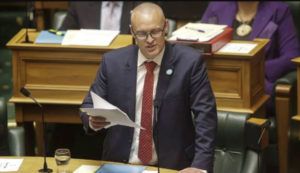[ad_1]

New Zealand Health Minister David Clark.
New Zealand completed the regulatory foundation for its medical cannabis sector this week, making a key concession by not requiring specialist approval for prescriptions.
When the new rules take effect April 1, 2020, all general practitioners will be able to prescribe medical cannabis products without oversight from a specialist.
Proposed medical cannabis regulations in July considered whether products should be prescribed by a doctor on top of a recommendation from a specialist, but industry sources had said the step would have been a “completely unnecessary.”
The final regulations establish the licensing requirements for domestic cultivation and manufacture of medical cannabis products.
“There is huge international interest in the potential of medicinal cannabis. These regulations mean New Zealand companies will be well placed to manufacture for both the local and international market,” Health Minister David Clark said in a statement.
Twenty companies are currently licensed to grow cannabis for research purposes.
Another 238 firms have permits to grow industrial hemp.
“It’s expected that at least some of these companies will apply for licences for medicinal cannabis,” Clark said.
The first commercial licenses are expected to be handed out by mid-2020 and products from local producers could be in pharmacies by the end of the year.
Import market
New Zealand will rely on imports to meet local demand until local producers are fully scaled up.
That will create export opportunities for GMP-certified companies in Canada and elsewhere.
Australian producers could also soon be in a position to export commercial quantities of medical cannabis.
Paul Manning, co-CEO of New Zealand marijuana producer Helius Therapeutics, said the local market could reach some 60,000 patients at maturity.
“More as clinically-proven products start coming through,” he said.
Countries typically rely on imports after launching medical cannabis programs until local producers have sufficient scale to meet demand. That scenario is currently playing out in Denmark and Germany.
“Our regulations require products to be GMP grade. I’m sure we’ll see more cannabis products coming in from Canada – and perhaps Australia, though we are already planning to export products across the Tasman later next year,” Manning said.
Domestic cultivation
When the new regulations take effect in April 2020, existing research and development license holders will be able to apply for commercial cultivation and manufacturing licenses.
Helius is one of 10 companies which already has an R&D license.
“We’re anticipating this process to be expedited, but could still take up to two months,” said Manning.
“Once granted, we can only carry 50 plants over from our already-operational facility. The rest have to be destroyed.”
That means the newly-licensed companies will need to go through a full growth cycle to produce the APIs for our first locally made products.”
Manning expects to see two or three local cannabis companies with products in the market by next Christmas – a more aggressive timeline than what has been seen in other countries.
Licenses
New Zealand is establishing a Medicinal Cannabis Agency to administer the program, including issuing licenses.
New Zealand will use a single medical cannabis license approach, meaning companies will hold one license but various activities can be added or removed.
According to the final regulations, a medicinal cannabis license authorizes a licence holder to carry out one or more of the following activities:
- Cultivation.
- Nursery propagation.
- Research.
- Possession for manufacture.
- Supply.
An application for a cultivation and supply will cost 12,550 New Zealand dollars ($8,200) plus an initial NZ$300 fee. If the application is for supply of a new product, a further NZ$13,400 in fees applies.
Other licenses that could still be required include a licence to manufacture medicines, a licence to pack medicines, sell medicines by wholesale, sell medicines by retail, import controlled drugs and export controlled drugs.
Need to know
- The regulations state that medical cannabis products are not allowed to be sold in a form intended for smoking.
- Any testing required must be carried out by a GMP-certified manufacturer or laboratory.
- The new rules will allow producers to onboard seeds and plants from illicit sources. Fifty seeds and 20 plants will be allowed per declaration, and a person can make more than 1 declaration for each variety.
- The regulations do not allow edibles, extracts and topicals for medical use to be prescribed.
- All medical cannabis products will be distributed from a pharmacy or directly from a medical practitioner.
Read the complete regulations here.
Go here for more details on New Zealand’s medical cannabis scheme.
[ad_2]
Source link










































